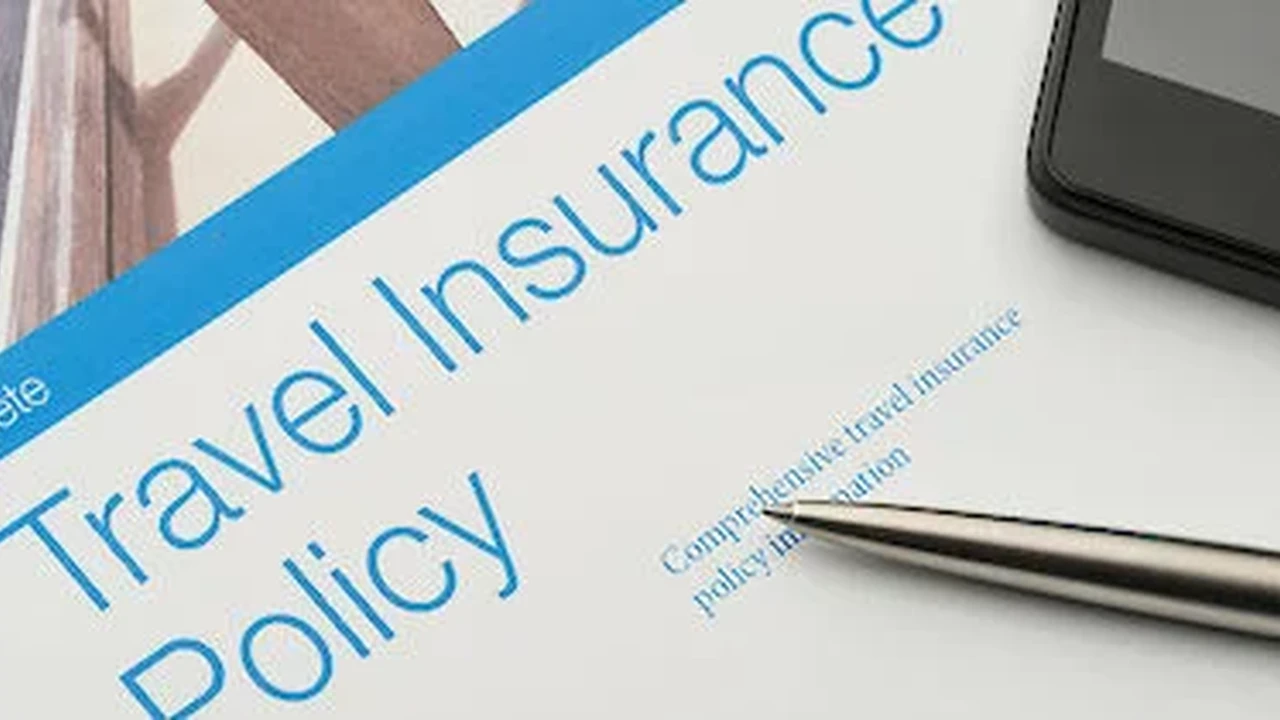Understanding Travel Insurance Policy Limits: How Much is Enough?

Why Travel Insurance Policy Limits Matter for Your Trip Protection
Okay, so you're planning a trip! Awesome! You've booked the flights, the hotels, maybe even a fancy cooking class in Tuscany. But before you pack your bags, let's talk about something kinda boring but super important: travel insurance policy limits. Think of these limits as the safety net for your wallet when things go sideways on your adventure. Basically, it's the maximum amount your insurance company will pay out for different types of claims. Ignore them and you might end up seriously out of pocket if something goes wrong. And trust me, Murphy's Law loves vacations.
Decoding Different Types of Travel Insurance Coverage and Their Limits
Travel insurance isn't just one big blob of protection. It's broken down into different categories, each with its own limit. Understanding these categories is key to choosing the right policy. Let's break it down:
- Trip Cancellation/Interruption: This covers you if you have to cancel or cut your trip short due to unforeseen circumstances like illness, injury, or a family emergency. The policy limit here is usually the total cost of your trip. So, if your trip cost $5,000, your cancellation coverage should be at least that much. Make sure you read the fine print, though! Some policies have specific exclusions, like pre-existing conditions or fear of travel.
- Medical Expenses: This is HUGE. Imagine getting sick or injured while you're abroad. Medical care can be incredibly expensive, especially in countries like the United States or Switzerland. A good policy should have medical expense coverage of at least $100,000, and preferably more. Look for policies that also cover emergency medical evacuation – that's getting you home if you need serious medical attention.
- Lost or Stolen Baggage: This covers you if your luggage goes missing or gets stolen. The limits here are usually lower, maybe around $1,000-$3,000 per person. Keep in mind that most policies have sub-limits for specific items like electronics or jewelry. Don't pack your grandma's diamond necklace in your checked bag!
- Travel Delay: This covers expenses you incur due to flight delays, like meals and accommodation. The limits are usually per day, maybe $100-$200, and there's usually a waiting period before the coverage kicks in (e.g., a 6-hour delay).
- Personal Liability: This covers you if you accidentally injure someone or damage their property while you're traveling. Think of it as your “oops, I knocked over that priceless vase” coverage.
Assessing Your Travel Needs to Determine Adequate Insurance Coverage Limits
Okay, so how do you figure out how much coverage you actually need? It's not a one-size-fits-all answer. It depends on a bunch of factors:
- Your Destination: Medical costs vary wildly from country to country. If you're traveling to a country with expensive healthcare, you'll need higher medical expense coverage.
- Your Activities: Are you planning on doing any adventurous activities like scuba diving, hiking, or skiing? These activities increase your risk of injury, so you'll want to make sure your policy covers them. Some policies exclude certain activities altogether.
- Your Health: Do you have any pre-existing medical conditions? Make sure your policy covers them, or at least doesn't exclude them. You might need to purchase a special rider to cover pre-existing conditions.
- The Cost of Your Trip: Your trip cancellation coverage should at least equal the total cost of your trip. If you've booked a non-refundable cruise, you'll want to make sure you have adequate cancellation coverage.
- Your Risk Tolerance: How comfortable are you with the possibility of paying out of pocket for unexpected expenses? If you're risk-averse, you'll want to choose a policy with higher limits and more comprehensive coverage.
Let's say you're going on a two-week trip to Europe. You're planning on visiting several different countries, doing some hiking, and eating lots of delicious food. You're also a bit of a klutz. In this case, you'd probably want a policy with high medical expense coverage, good trip cancellation coverage, and coverage for adventurous activities. If you were just going on a relaxing beach vacation, you might be able to get away with lower limits.
Understanding Policy Exclusions Travel Insurance Won't Cover
It's not all sunshine and rainbows. Travel insurance policies have exclusions – things they won't cover. These can vary from policy to policy, but some common exclusions include:
- Pre-existing Medical Conditions: As mentioned before, many policies exclude pre-existing conditions unless you purchase a special rider.
- Acts of War or Terrorism: Most policies exclude claims arising from acts of war or terrorism.
- Participation in Illegal Activities: If you get injured while engaging in illegal activities, your policy won't cover you.
- Extreme Sports: Some policies exclude extreme sports like skydiving or bungee jumping.
- Traveling Against Medical Advice: If your doctor advises you not to travel, and you do anyway, your policy might not cover you.
- Intoxication: If you're injured while under the influence of alcohol or drugs, your policy might not cover you.
Always read the fine print and understand the exclusions before you purchase a policy. If you're unsure about something, contact the insurance company and ask for clarification.
Real-Life Examples When Adequate Policy Limits Saved the Day
Let me tell you a couple of stories. First, my friend Sarah went to Thailand and contracted a nasty case of food poisoning. She needed to be hospitalized and received IV fluids and medication. Her medical bills came to over $5,000. Luckily, she had a travel insurance policy with $100,000 in medical expense coverage, so she didn't have to pay a dime out of pocket.
Another friend, Mark, was on a business trip to London when his laptop was stolen from his hotel room. He filed a claim with his travel insurance company, and they reimbursed him for the cost of the laptop, up to the policy limit for lost or stolen baggage. These are just a few examples of how travel insurance can save you from financial disaster.
Comparing Travel Insurance Plans and Their Coverage Limits
Alright, let's get down to brass tacks. Here are a few travel insurance companies and a look at their coverage limits. Keep in mind that these are just examples, and you should always compare policies from multiple companies before making a decision. Prices are estimates and can vary depending on your age, destination, trip length, and other factors. Always get a personalized quote!
Recommended Travel Insurance Products with Coverage Details and Pricing
World Nomads Explorer Plan: Adventure Travel Insurance
Coverage Highlights:
- Trip Cancellation/Interruption: Up to the trip cost
- Medical Expenses: Up to $100,000
- Emergency Medical Evacuation: Unlimited
- Lost or Stolen Baggage: Up to $3,000 (with sub-limits for electronics and jewelry)
- Adventure Activities: Covers a wide range of adventure activities
Using Scenarios: World Nomads is a great choice for adventurous travelers who are planning on doing activities like hiking, scuba diving, or snowboarding. It's also a good option for long-term travelers or backpackers. They have a flexible policy that allows you to extend your coverage while you're on the road.
Pros:
- Comprehensive coverage for adventure activities
- Flexible policy that can be extended while traveling
- 24/7 emergency assistance
Cons:
- Can be more expensive than other policies
- May not be the best option for travelers with pre-existing medical conditions
Estimated Price: $80 - $200 for a two-week trip to Europe, depending on age and coverage options.
Allianz Global Assistance AllTrips Premier Plan: Comprehensive Travel Protection
Coverage Highlights:
- Trip Cancellation/Interruption: Up to the trip cost
- Medical Expenses: Up to $50,000
- Emergency Medical Evacuation: Up to $500,000
- Lost or Stolen Baggage: Up to $2,000
- Travel Delay: Up to $800 ($200 per day)
Using Scenarios: Allianz Global Assistance is a solid choice for general travel protection, especially for families or those looking for a reliable and well-known provider. Their AllTrips Premier plan offers decent coverage for medical emergencies, trip cancellations, and baggage loss.
Pros:
- Reputable and established insurance provider
- Good coverage for trip cancellation and interruption
- 24/7 emergency assistance
Cons:
- Medical expense coverage may be lower than some other plans
- May not be the best option for adventure travelers
Estimated Price: $60 - $150 for a two-week trip to Europe, depending on age and coverage options.
Travel Guard Essential Plan: Budget-Friendly Travel Insurance
Coverage Highlights:
- Trip Cancellation/Interruption: Up to the trip cost
- Medical Expenses: Up to $15,000
- Emergency Medical Evacuation: Up to $250,000
- Lost or Stolen Baggage: Up to $1,000
- Travel Delay: Up to $500 ($100 per day)
Using Scenarios: Travel Guard's Essential Plan is a budget-friendly option for travelers who are primarily concerned with trip cancellation and interruption coverage. While the medical expense coverage is lower than other plans, it can still provide some protection against unexpected medical bills.
Pros:
- Affordable price point
- Good coverage for trip cancellation and interruption
- 24/7 emergency assistance
Cons:
- Lower medical expense coverage compared to other plans
- May not be suitable for travelers with pre-existing medical conditions or those traveling to countries with high medical costs
Estimated Price: $40 - $100 for a two-week trip to Europe, depending on age and coverage options.
Comparing Product Features and Limitations for Informed Decisions
When comparing these plans, consider these key differences:
- Medical Expense Coverage: World Nomads offers the highest coverage at $100,000, while Travel Guard offers the lowest at $15,000. If you're traveling to a country with expensive healthcare, this is a crucial factor.
- Emergency Medical Evacuation: World Nomads offers unlimited coverage, while Allianz and Travel Guard offer $500,000 and $250,000 respectively. This is important if you need to be airlifted to a hospital.
- Trip Cancellation Coverage: All three plans offer coverage up to the trip cost.
- Adventure Activities: World Nomads is the only plan that specifically covers a wide range of adventure activities.
- Price: Travel Guard is the most affordable option, while World Nomads is the most expensive.
Ultimately, the best travel insurance plan for you will depend on your individual needs and budget. Don't just pick the cheapest option! Take the time to compare policies and choose the one that offers the best coverage for your specific trip.
Tips for Choosing the Right Coverage Limits and Avoiding Underinsurance
Here are a few final tips to help you choose the right coverage limits and avoid being underinsured:
- Err on the side of caution. It's always better to have too much coverage than not enough.
- Consider your destination. Medical costs vary widely from country to country.
- Think about your activities. If you're planning on doing any adventurous activities, make sure your policy covers them.
- Read the fine print. Understand the exclusions and limitations of your policy.
- Don't be afraid to ask questions. If you're unsure about something, contact the insurance company and ask for clarification.
- Update your policy if your trip changes. If you add a new activity or extend your trip, make sure your policy covers it.
Navigating Travel Insurance Claims and Maximizing Reimbursement
So, you've bought your travel insurance, had an incident, and now you need to file a claim. What do you do? Here are some tips to make the process smoother:
- Document everything. Keep copies of all your receipts, medical records, police reports, and any other relevant documents.
- File your claim as soon as possible. Most policies have a deadline for filing claims.
- Be honest and accurate. Provide all the information requested by the insurance company.
- Follow up on your claim. Don't be afraid to contact the insurance company to check on the status of your claim.
- Appeal if necessary. If your claim is denied, you have the right to appeal the decision.
By following these tips, you can increase your chances of a successful claim and get the reimbursement you deserve. Remember, travel insurance is there to protect you, so don't be afraid to use it!
The Importance of Regularly Reviewing Your Travel Insurance Needs
Your travel insurance needs can change over time. As you get older, your health needs may change. You may start taking more adventurous trips or traveling to more remote locations. It's important to regularly review your travel insurance needs and make sure your policy still provides adequate coverage. Consider reviewing your policy every year or whenever you have a significant change in your travel plans or health.
:max_bytes(150000):strip_icc()/277019-baked-pork-chops-with-cream-of-mushroom-soup-DDMFS-beauty-4x3-BG-7505-5762b731cf30447d9cbbbbbf387beafa.jpg)






